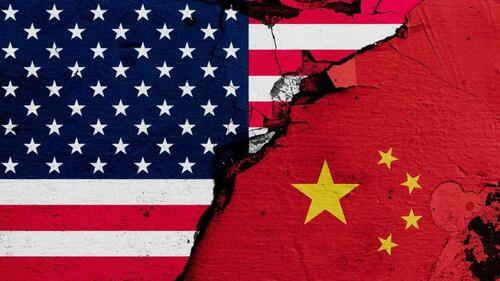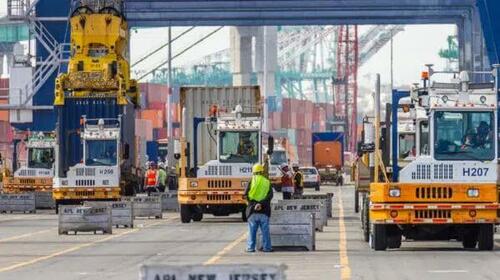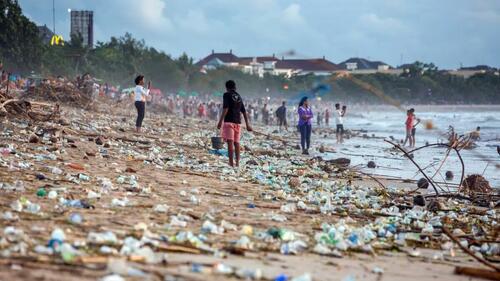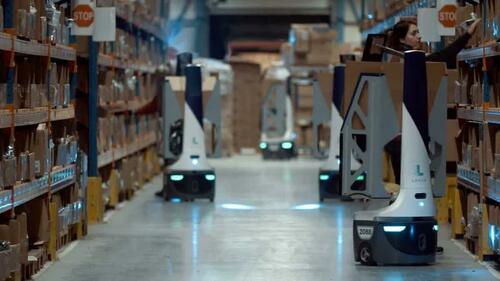
Posted on 05/20/2022 5:22:30 AM PDT by blam
The conventional wisdom at this time is that most of the world has moved on from the pandemic (except for China); therefore, supply chains will return to “normal.” Unfortunately, this is not the case. The world has permanently changed and supply chains are going to face continuing challenges for decades to come. Among those challenges are:
◾Supply chains will remain under constant threat of disruption for the next decade
◾Supply chains operate best when the world is peaceful and stable
◾A smoothly running supply chain requires “buffer stock,” which is challenging with declining population demographics
◾There is a conflict between environmental, social and governance (ESG) goals and supply chains optimized for cost and speed. If we prioritize ESG, we will need to contend with supply chain risks
◾Supply chain technology will become the big venture capital category winner as companies continue to make investments in technologies that can help them mitigate their supply chain challenges
In a world faced with the prospect of tightening supplies, higher energy costs, heightened geopolitical risk, and strained transportation networks, advanced supply chain technologies will become mission-critical for many more companies.

Supply chains benefit from times of peace
Anyone that has been a part of the supply chain industry can attest to the fact that supply chains have always been subject to disruptions. Natural disasters, terrorism, economic cycles, and capacity shortages have created challenges since the beginning of trade.
Since the end of the Cold War, global supply chains have benefited from peaceful trade between developed and developing countries. Many poorer and less developed countries that were previously ruled by Communist or autocratic regimes took advantage of new markets in the developed world and used global trade to move beyond subsistence economies to prosperous ones. Some of these countries developed into capitalistic and democratic countries, while other governments exploited the free market system to solely benefit those already in power, and became wealthy and powerful enough to threaten the very system that enabled their ascension.
The Eastern European countries that were formerly part of the Soviet bloc are examples of the countries that embraced capitalism and shifted toward democracy, while China did the opposite.

Dockworkers at the Port of Los Angeles.
Labor is key in supply chains
The arbitrage between the developed and developing countries has been massive. The cost of producing goods in countries with cheap labor, lax environmental and labor regulations, and little regard for sustainable natural resources has enabled the world to enjoy unprecedented prosperity and peace.
Because the goods produced in these parts of the world were so cheap, it made sense that they would be produced in excess. This buffer stock kept inflation in check and provided supply chains with ample supplies that could fend off short-term fluctuations and disruptions. Think about how the cost of televisions and computing hardware has fallen over the past few decades, and how auto prices haven’t risen as significantly as the many improvements in product features and quality were made.
This all happened at a time when the United States was the only superpower and the only expectation that the U.S. had of other nations is that trade should be unobstructed.
Cheap labor is becoming scarcer, particularly in Asia. This is largely due to aging populations – the average age continues to increase and there are fewer people to work in these manufacturing jobs.

Pollution in one part of the world can impact other areas.
ESG requirements hamper the stability of supply chains
Companies have instituted ESG requirements that require disclosures and monitoring of how and where products have been sourced. This pressure means that goods that are produced in factories that don’t match Western standards for environmental controls and human rights may not be available to Western consumers. The factories that do produce goods that match Western standards will often be more expensive and therefore there will be less buffer stock in the system.
The same ESG standards also create challenges for commodity producers, as the cost of adhering to environmental and social disclosures makes it more expensive and less productive. It also discourages investment in the production of environmentally sensitive commodities – most obviously in energy.
Environmental concerns and regulations that have prevented exploration and production and killed pipeline projects are largely the reason that the world currently lacks sufficient energy resources to buffer against the consequences of the Russia-Ukraine war.
In the previous three decades, supply chains have operated relatively smoothly because companies could source from around the world and not have to worry about global military conflict or autocratic regimes shutting down manufacturing. While international trade regulations were complicated to navigate, the world overall was trending toward larger, more open trading blocs – not just in North America, but in Europe and Asia as well.
As the United States has become more insular and has pulled back from being the world’s policeman, and China has started to flex its muscles and create a global competitor to the United States, the world has become far more unstable and less peaceful. This global friction is unlikely to go away. China desires to take Taiwan as its own, risking sending the world into a geopolitical crisis that is more dangerous than at any point since World War II.
Buffer stocks of products are far less likely in the future, as the cost of producing those items continues to rise. Cheap labor, offered by large populations of young people, is largely a thing of the past. This will make it more expensive for companies to produce buffer stock and far less likely that supply chains will enjoy the ability to absorb short-term shocks that are inherent to complex global networks.

Supply chain technology will be the big winner
Companies will look closer to home for product sourcing. They will prioritize production in countries that are far more stable and friendly to the United States. The Freedom Trade movement will drive supply chain professionals to prioritize production and sourcing in the Americas.
Latin America will become a big winner, as it benefits greatly from having direct land transportation networks with North America and seas that are well protected by the U.S. Navy.
The American South and Midwest will also see an acceleration in manufacturing and production, as they can offer predictable and resilient sourcing, without the geopolitical risks of foreign suppliers or the labor unions of the Rust Belt.
Automation, including robotics, will become more important. Nearshoring manufacturers will try to offset higher production costs with robotics and other automated production systems.
Supply chain market intelligence systems, a data category that monitors developments around supply and demand, will be critical for supply chain professionals who are trying to navigate increasingly complex and opaque markets. Materials and product supplies are no longer guaranteed, so the need for constantly refreshed data models that track the balance of supply and demand will be critical to the success of companies.
FreightWaves SONAR provides near real-time market intelligence information, which has seen explosive growth in recent months as shippers have realized that supply chains are not returning to normal and the need for high-frequency data is increasingly critical for success. Historical models no longer work – as the world becomes far less predictable, peaceful, and safe – and supply chains are far more exposed to supply and demand shocks.
They said the same BS about the economy when Obama was president, that this was the “new normal”.
But all it took was Trump and his policies to fix everything.
Beat me to it, you are 100% correct
Modern Americans suffer from extreme normalcy bias. Do people not understand that the last 75 year is an extreme aberration? Supply chains have been fickle throughout human history, that’s the norm, not that exception. Being poor and fat is mostly a modern American phenomenon, people mostly chase food, that’s always been the norm. Vic’s have always been impressive by nature, but where we are shocked by the Dems, et al wanting to impose their will on us. Bowing down to the nerds (lib beta males) and other weakest among us (lgbt, ghetto clowns, etc) and ceding control of the national narrative to them, yep.. also a modern American phenomenon.
My point in all this is life has history been hard, violent and short throughout our entire history. Now that modern America is in a state of collapse, we’re all shocked! What the hell did everyone think was going to happen?
There’s a lot of BS in this one.
For example,
> Environmental concerns and regulations that have prevented exploration and production and killed pipeline projects are largely the reason that the world currently lacks sufficient energy resources to buffer against the consequences of the Russia-Ukraine war.
Keystone was killed and the oil is still moving via rail. Not coincidentally, rail largely owned by Warren Buffet/Berkshire Hathaway, a huge Dem contributor.
Underlying many of the arguments is belief in CACC, catastrophic anthropogenic climate change. This would be a belief I do not hold.
Damn typos, what would it take to get an edit button around this place!
What a crap article. It says almost nothing, and most of what it does say is pablum.
Meanwhile, still no word on the status of the Ports America sale to the Canadian catspaw for the ChiComs...
The world recovered from WWII in 10 years. But that was then, this is now
Supply Chain Congestion Set To Worsen As Container Rates Rebound On Easing China Lockdowns
When you have a piss poor education system that doesn't teach that Liberty is a very rare and precious thing you get a bunch of dumb skulls full of mush that are going to be very surprised when they can't Tweet, watch the latest updates of Depp vs. Heard or better yet obtain food.
A supply chain management process built on precision is delusional.
As our supply chains have become increasingly refined over time, they have also become increasingly brittle. This means that even a small failure or disruption can have catastrophic consequences.
As I once told a client of mine who was trying to develop technology to improve the efficiency of one particular link in the U.S. transportation system ... "You are over-thinking this and chasing a ghost if you think you can do this well. Refining your asset to such a high degree of precision is like measuring a warehouse operation to the tenth of a second while it is being supplied by sailing ships that measure time using a calendar and an hourglass."
Right now the world has a population of 8 billion people. Many are in poverty stricken countries and on the edge of malnourishent at the best of time. Food production decisions made now are going chart the course of what happen over the next 12 months. Back when people produced their own food, it used to be food production decisions were considered the life and death decisions that they actually are. In today’s world of agribiz where less than 1% of the population is involved in food production, food production is a simple business decision made by a hand full of people. Decisions being made now by those decision makers are going to have consequences in the next 12 months or so. We are looking at the potential for a world wide crisis and our leaders are doing the exact opposite of needs to be done to deal with the situation.
The maritime college in Maine has a major: International Business and Logistics. A three month COOP is required between the junior and senior year. In the past few years all of the graduates of this program have had multiple job offers in the supply chain arena.
That is not the whole story.
The costs to build the pipeline have to be paid. Once these costs are recaptured, then moving the oil by pipeline is much lower than by rail.
I believe that Keystone costs (when it was cancelled) were over $10B. So it could have been over 10 years or more before shipping costs would go down.
Ping
Besides the scarcity of fuel, there is the CAlifornication of the left coast. With punishing regulations on what big rigs can enter the state to unload shipping containers, one would think that container ships would prefer to unload in OR or WA. Maybe they are ... I just haven’t seen any news to that effect. Getting CA to moderate their trucking restrictions would be a big help.
Disclaimer: Opinions posted on Free Republic are those of the individual posters and do not necessarily represent the opinion of Free Republic or its management. All materials posted herein are protected by copyright law and the exemption for fair use of copyrighted works.